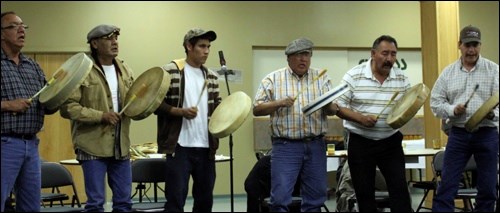Umbá wasté is a traditional Nakoda greeting. Translated into English umbá wasté means "good day."
Oct. 18-21, 170 Nakoda from Saskatchewan, Alberta and Montana gathered in the Cypress Hills for the first time in over 100 years, when Nakoda ancestors used the Cypress Hills as a wintering ground.
Thirty-five members from Mosquito First Nation were able to make the journey to this historic four-day conference. Organized, in part, by Clayton Armstrong, Freida O'watch, Noelle Stone and the Mosquito council members, the aim of this five-year plan was to bring together the Nakoda Band to listen and learn from one another the ways in which the Nakoda language is being rejuvenated within their communities.
The conference was an amalgamation of traditional knowledge and contemporary education. Participants spent three days presenting various strategies to excite and immerse youth in their mother tongue.
"We need to develop a program that will cause the young people to see how important language is," says J.R. Two Young Men from Chiniki First Nation, Alta.
Presenters gave examples of new ways of using technology to engage and assist in language retention. Some suggestions were: a device known as a Phraselator, "word of the day" on sites like Facebook, encouraging text messages in the Nakoda language, and the use of stop-motion animation as a new form of storytelling.
It was agreed language retention begins at home. Language is more than words, it is culture, identity and a sense of belonging.
"Language is essential and defines us as a people." says Dutch Lerat, vice-chief of Federation of Saskatchewan Indian Nations.
Traditional Nakoda ceremonies were an integral part of sharing language over the four days. Attendees participated in a sweat, a round dance, hand games, storytelling, and pipe ceremonies.
During his presentation, Roger White Jr. from Fort Peck First Nation, Mont. made the statement, "Language is alive, it is living."
According to the Saskatchewan Indian Culture Centre there are approximately 3,492 Nakoda living in Saskatchewan, of those, only nine per cent are fluent speakers with the majority of those being elderly. Listening to the youth, the upstanding students from Mosquito, Carry the Kettle and Chiniki First Nations who were invited to come and share how and why they are learning their language, you could feel a true sense of hope the Nakoda language will grow in the years to come.
The intent of this conference was to not only look at and develop further ways of keeping the Nakoda language alive with youth in the communities, but to begin the road to a confederacy among the Nakoda Nation
"How do we govern ourselves? How do we set up a confederacy? These borders mean nothing to us; overlook those borders, look at us as a tribe, a family," said James O'watch from Carry the Kettle First Nation in Saskatchewan in his presentation
Over the next month a Committee will be established with representatives from each Nakoda Band to help execute this five-year plan and put into place ideas brought forth for next year's Nakoda Language and Culture Conference. Thus begins the journey to establishing a future Nakoda Confederacy.




